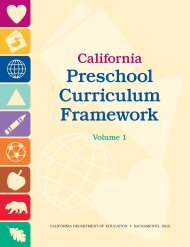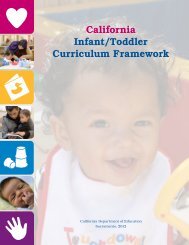California Preschool Learning Foundations - ECEZero2Three ...
California Preschool Learning Foundations - ECEZero2Three ...
California Preschool Learning Foundations - ECEZero2Three ...
You also want an ePaper? Increase the reach of your titles
YUMPU automatically turns print PDFs into web optimized ePapers that Google loves.
Listening and Speaking<br />
Language Use and Conventions.<br />
The development of oral language is<br />
one of the most impressive accomplishments<br />
that occur during the first<br />
five years of children’s lives (Genishi<br />
1988). Oral language development<br />
results from the interaction of a variety<br />
of factors, including social, linguistic,<br />
maturational/biological, and cognitive<br />
influences, and these factors interact<br />
and modify one another (Bohannon<br />
and Bonvillian 2001). Research indicates<br />
that social factors have a prominent<br />
role on oral language development.<br />
For example, the wide variation<br />
in the rate of children’s early language<br />
growth and later language outcomes<br />
is directly related to differences in<br />
maternal and other caretakers’ verbal<br />
input (Baumwell, Tamis-LeMonda,<br />
and Bornstein 1997; Girolametto and<br />
Weitzman 2002; Hart and Risley 1995;<br />
Landry and others 1997; Pellegrini and<br />
others 1995; Tamis-LeMonda, Bornstein,<br />
and Baumwell 2001).<br />
The language use and conventions<br />
substrand focuses on children’s use<br />
of language for social and communicative<br />
purposes. Four aspects of<br />
language use are emphasized in the<br />
foundations: using language to communicate<br />
with others for a variety of<br />
purposes, increasing clarity of communication<br />
(i.e., phonology), developing<br />
an increasing understanding of the<br />
conventions of language use (i.e., pragmatics),<br />
and using language for narrative<br />
purposes. The first component of<br />
the foundation emphasizes the child’s<br />
Bibliographic Notes<br />
<strong>California</strong> Department of Education • <strong>Preschool</strong> <strong>Learning</strong> <strong>Foundations</strong>, Volume 1<br />
71<br />
ability to use language for a variety<br />
of different purposes. Each time children<br />
produce language, an intention is<br />
being expressed. As children develop<br />
their language abilities during early<br />
childhood, the range of intentions they<br />
express expands. They use language<br />
not just to request, reject, and comment,<br />
but to acknowledge, to greet,<br />
to understand, to solve problems,<br />
to hypothesize, to regulate, and to<br />
describe, among other uses.<br />
The second component centers on<br />
the ability of young children to learn<br />
to use understandable pronunciation<br />
and words. This development pertains<br />
to the articulation of specific words<br />
and the expression of specific sounds<br />
rather than to the overall way in which<br />
children speak or whether they speak<br />
with an accent. Young children may<br />
speak in ways that may contain pronunciation<br />
errors and idiosyncratic<br />
words. Usually their communication is<br />
understood by familiar adults and children.<br />
As children continue to develop,<br />
they usually speak with clear pronunciation<br />
and use common words. Their<br />
speech is usually understood by both<br />
familiar and unfamiliar adults and<br />
children.<br />
The third component of the foundation<br />
focuses on children’s increasing<br />
understanding of the conventions of<br />
communication, including conversational<br />
participation and the ability to<br />
sustain a topic over turns, and the use<br />
of appropriate verbal and nonverbal<br />
communicative behaviors, including<br />
adapting language based on communicative<br />
partners and situations.<br />
LANGUAGE AND LITERACY
















